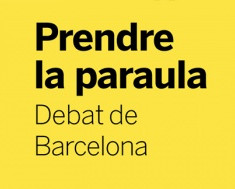 Barcelona Debate 2015 is about to end with the lecture that will be given by the sociologist Peter Wagner, who will situate the concepts of “progress” and “modernity” within the framework of today’s political vocabulary and propose new readings and perspectives in order to update their meanings.
Barcelona Debate 2015 is about to end with the lecture that will be given by the sociologist Peter Wagner, who will situate the concepts of “progress” and “modernity” within the framework of today’s political vocabulary and propose new readings and perspectives in order to update their meanings.
In your lecture on 9 March you will be revising the political concepts of “progress” and “modernity”.
I’ll be talking about the notion of “progress” in relation with that of “modernity” by starting to look at how western societies have grown considerably with the progress they’ve made over the past two centuries, when progress was understood not only as a possibility but as something that was really happening: it was believed that society would keep improving. Things went on like that until thirty or forty years ago but, between 1979 and 1989, something happened which made us lose our faith in progress. In my lecture I’ll discuss the reasons for this loss of faith and explain that, as a society, we have too many things that need improving so we can’t give up and abandon the idea of “progress”. We must try to recover it and, probably, give it new meaning.
What are the dimensions of progress?
One of the problems that comes down from our forebears was that they developed a notion of “progress” that implied improvement on every front, which was the basis of their great faith in this idea. It also led to great disappointments when progress did not work as they had expected. I’ll be talking about four components of progress: progress in knowledge, economic progress (by which I mean satisfying human needs), social progress, and political progress. We need to distinguish among them and look at where progress has occurred and where it hasn’t, in what field, at every point in time, and also the conditions necessary for progress in each of these dimensions.
What brings about progress?
If we look back, it’s quite shocking to see this huge faith in progress. Before 1800, people could see that things were getting better but they also knew that they could go wrong again any moment, so they went on like that with ups and downs in terms of improvement and without believing in any form of progress that might last forever. However, after the French Revolution all this changed with Enlightenment ideas and the assumption of “man’s release from his self-incurred immaturity”, as Kant put it when expressing his hypothesis that free, autonomous human beings would tend to improve their condition. This was the great driving force. Thenceforth, we can see very clearly the lines of progress in knowledge and those of material progress, and it was assumed that free human beings could pursue their own interests and, with this freedom, the wealth of nations would grow and everyone would live better. The idea, then, was that freedom entailed progress.
How did perceptions of progress change after the 1980s?
The great let-down had already begun midway through the twentieth century, but in the seventies and eighties people were beginning to see clearly that, although this freedom had been achieved, it had not brought progress or at least not on every front. Herein lies the historic misunderstanding: I’ll explain that, historically speaking, the progress we have made was not the result of interaction between free human beings but through exploitation. In fact, there were not many free people in the nineteenth century because the majority were oppressed and what there was, therefore, was the freedom of the European elites to exploit nature, exploit the colonies and exploit the working classes of their societies, which brought material progress, but material progress by means of exploitation. The mechanism of domination and resistance to domination is what brought about progress and this came to an end between 1970 and 1980 with decolonisation, women’s liberation and equality of rights in practically all societies. This is why we need to rethink progress: we can no longer achieve further progress on the basis of the mechanisms of domination and resistance so we need to define what progress is now that we are free and equal.







